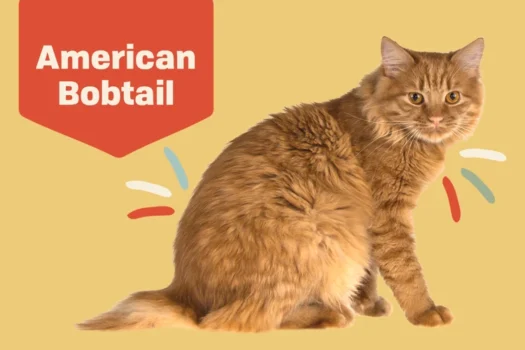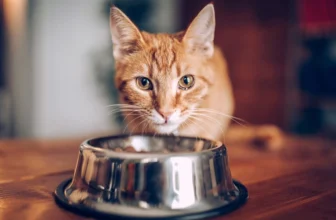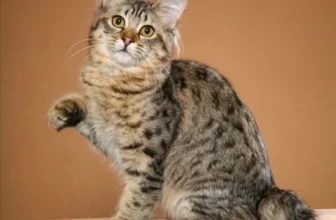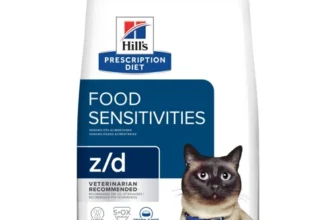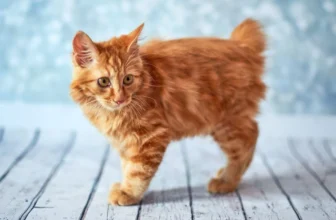As a proud owner of an American Bobtail cat, ensuring that your furry friend receives the proper nutrition is crucial. However, with a plethora of information available regarding their dietary needs, it may seem challenging to fully understand what is required to keep your pet healthy and happy. That’s why we’ve done the research and created this comprehensive guide to help you provide the best possible nutrition for your American Bobtail. From protein, carbohydrates, fats, vitamins, and minerals to special dietary considerations, feeding tips, and more, this article covers it all. So, let’s dive into the world of American Bobtail cat nutrition and discover how to keep your feline friend feeling furbulous!
The Basics of American Bobtail Cat Nutrition
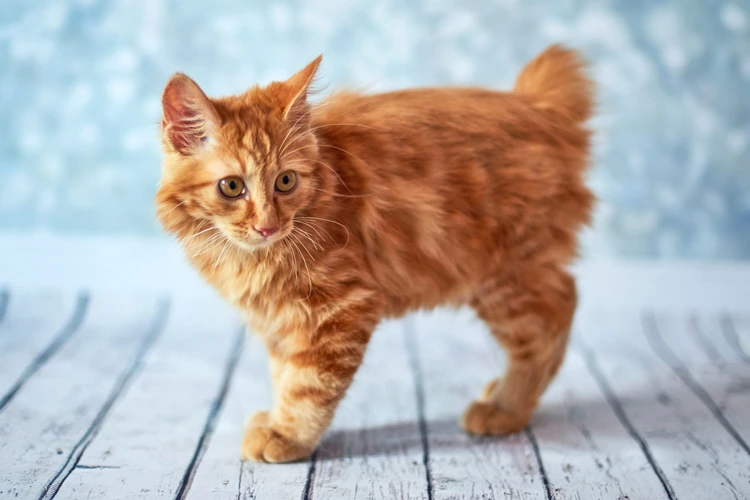
As a responsible pet owner, it’s important to understand the nutritional needs of your American Bobtail cat. Meeting their dietary requirements is essential for their optimal health and wellbeing. The first step in providing proper nutrition is understanding the basics of macronutrients and micronutrients that are necessary to keep your cat healthy. These include proteins, carbohydrates, fats, vitamins, and minerals. In this section, we will explore each of these fundamental nutritional components in depth, and provide you with some valuable feeding tips to keep your American Bobtail cat in peak condition. Additionally, we will include links to other informative articles so that you can expand your knowledge on specific topics.
Protein Needs
Protein is the most important macronutrient for American Bobtail cats. It makes up the building blocks of muscles and essential body tissues. They require a high protein diet to maintain lean muscle mass and support their active lifestyle. Protein also helps in repairing damaged tissues and producing enzymes and hormones.
The protein requirement for American Bobtail cats varies depending on their age, weight, and activity level. Kittens need higher amounts of protein to support their growth and development compared to adult cats. The average adult American Bobtail cat needs around 25-35% of their diet to come from protein.
It is important to choose high-quality protein sources for your cat’s diet. Great sources of protein for American Bobtail cats include:
- Chicken
- Turkey
- Beef
- Lamb
- Fish
- Eggs
It’s important to note that not all protein sources are created equal. Some sources are easier to digest than others. Additionally, some American Bobtail cats may have food allergies or intolerances to certain protein sources, which may cause digestive issues or allergic reactions. It’s always best to consult with a veterinarian before introducing a new protein source to your cat’s diet.
Avoid using plant-based protein sources exclusively, as they are not suitable for obligate carnivores like American Bobtail cats. Plant-based protein sources like soybeans or corn gluten meal are not as beneficial for cats because they cannot utilize the protein as effectively as they can from animal sources.
Overall, it’s important to ensure that your American Bobtail cat’s diet is balanced and includes sufficient amounts of protein, fat, and carbohydrates. If you are unsure about how to balance these macronutrients in your cat’s diet, consult with a veterinarian or a qualified animal nutritionist.
To learn more about balancing macronutrients in American Bobtail cat’s diet, check out this informative article on balancing macronutrients for American Bobtail cats. If you are considering a homemade diet for your cat, it’s important to know the pros and cons before making the switch. Check out our article on homemade diets for American Bobtail cats for more information.
Carbohydrate Needs
Carbohydrates are an important nutrient for American Bobtail cats, providing them with energy for their daily activities. However, unlike humans, American Bobtail cats do not need a large amount of carbohydrates in their diet. In fact, they are obligate carnivores, meaning that their diet should consist primarily of protein.
According to research, American Bobtail cats require no more than 10% of carbohydrates in their daily diet. This means that cat owners should be careful not to rely too heavily on carbohydrate-heavy ingredients such as grains or vegetables when creating their cats’ meals.
Here is a table that outlines some healthy carbohydrate sources for American Bobtail cats:
| Carbohydrate Source | Carbohydrate Percentage |
|---|---|
| Peas | 7.5% |
| Pumpkin | 8.9% |
| Sweet Potato | 12.7% |
It’s important to note that while carbohydrates can provide some nutritional benefits for American Bobtail cats, they should not be the primary focus of their diet. Instead, cat owners should look for high-quality protein sources such as chicken, turkey, and fish. Additionally, adding in supplements such as taurine can help ensure that their cats are receiving all of the necessary nutrients they need.
Looking to learn more about the best protein sources for American Bobtail cats? Check out our article on best protein sources for American Bobtail cats.
However, it’s also important to be mindful of the potential risks associated with feeding diets that are too high in carbohydrates. Some American Bobtail cats may be more prone to developing health issues such as obesity and diabetes if their diet is not properly balanced. Thus, it’s important that cat owners consult with their veterinarian to ensure that their cat’s diet is tailored to their unique nutritional requirements.
Curious about common mistakes to avoid when creating a homemade diet for your American Bobtail cat? Be sure to read our article on bobtail cat homemade diet mistakes.
While American Bobtail cats require some carbohydrates in their diet, it’s important to be mindful of the amount and quality of carbohydrates they consume to ensure that they are receiving the proper nutrition they need to thrive.
Fat Needs
American Bobtail cats require healthy fats in their diets to maintain their overall well-being. Fat is a major source of energy for cats and provides essential fatty acids that are important for their skin and coat health, brain and eye development, and immune system function.
Types of Fats
There are different types of fats, including saturated and unsaturated fats. Saturated fats are typically found in animal-based products and are known to increase unhealthy cholesterol levels in the body. It’s recommended to limit the amount of saturated fats in your American Bobtail cat’s diet.
On the other hand, unsaturated fats are known as healthy fats and include monounsaturated and polyunsaturated fats, which are commonly found in plant-based oils and fish. These types of fats can help reduce bad cholesterol levels in the body.
Fatty Acid Requirements
Omega-3 and omega-6 are two essential fatty acids that are crucial for your American Bobtail cat’s health. Omega-3 fatty acids support brain development, vision, and heart health, while omega-6 fatty acids help with skin and coat health and immune system function.
Cats require a higher amount of omega-6 fatty acids in their diet compared to omega-3 fatty acids. The ideal ratio of omega-3 to omega-6 fatty acids should be around 1:4 or 1:5.
Sources of Healthy Fats
Include a variety of healthy fats in your American Bobtail cat’s diet. Here are some sources of healthy unsaturated fats:
- Salmon, tuna, and other oily fish
- Canola oil, flaxseed oil, and other plant-based oils
- Chicken fat and other poultry fats
- Fish oil and krill oil supplements
It’s important to note that some cat food brands may not include enough healthy fats in their recipes. Check the label for the fat content and ingredients to ensure you are providing your cat with a balanced diet. If your cat is not receiving enough healthy fats from their diet, consider incorporating supplements like fish oil or krill oil. But, before providing supplements please consult with your veterinarian.
Excess Fat Intake
Overfeeding your American Bobtail cat with fat-rich food can lead to obesity, which can result in health problems like diabetes, heart disease, and arthritis. Ensure your cat is maintaining a healthy weight by measuring their food portions according to their age, weight, and activity level.
To maintain an ideal weight for your American Bobtail cat, it’s important to incorporate exercise into their daily routine. Take time to play with your cat, provide them with toys and games that encourage activity, and create a stimulating and active environment at home.
American Bobtail cats require healthy fats in their diets to maintain their overall health and well-being. Ensure that your cat is receiving a balanced diet that includes a variety of healthy fats, and don’t overfeed them with fat-rich food. Check with your veterinarian about any concerns or questions regarding your American Bobtail cat’s diet and supplements. If your cat is underweight or overweight, work with your vet to create an effective nutrition and exercise plan.
Vitamin and Mineral Needs
To keep your American Bobtail cat healthy, it’s crucial to ensure they’re getting the right amount of vitamins and minerals in their diet. These nutrients serve various roles in your cat’s body, from supporting their immune system to aiding in proper organ function. Below is a table to help you understand the essential vitamins and minerals that your American Bobtail cat needs, their functions, and good food sources:
| Nutrient | Function | Food Sources |
| Vitamin A | Supports vision, immune system, and skin health | Beef liver, chicken liver, eggs, whole milk |
| Vitamin D | Helps in bone and teeth formation, calcium regulation | Cods liver oil, egg yolk, beef liver, fatty fish |
| Vitamin E | Antioxidant, cell membrane protection | Salmon, liver, sardines, eggs, nuts and seeds |
| Vitamin K | Supports blood clotting and bone health | Green leafy vegetables, spinach, broccoli, liver |
| Vitamin B1 (Thiamine) | Supports normal brain and nervous system function | Pork, poultry, fish, brown rice, whole grains |
| Vitamin B2 (Riboflavin) | Supports energy production, skin and coat health | Beef liver, lamb, yogurt, milk, eggs |
| Vitamin B3 (Niacin) | Supports energy production, digestive health | Chicken breast, turkey, liver, peanuts, mushrooms |
| Vitamin B5 (Pantothenic Acid) | Supports energy metabolism and hormone production | Avocado, beef liver, chicken liver, sunflower seeds |
| Vitamin B6 (Pyridoxine) | Supports red blood cell formation, nervous system function, immune system, and protein metabolism | Pork, poultry, fish, whole grains, nuts, vegetables |
| Vitamin B12 (Cobalamin) | Supports the nervous system and blood cell production | Liver, kidney, heart, eggs, cheese, fish and shellfish |
| Calcium | Supports strong bones and teeth, nerve and muscle function | Milk, cheese, yogurt, sardines, canned salmon |
| Phosphorus | Supports bone, muscle, and nerve function, energy production | Meat, poultry, fish, eggs, pumpkin seeds |
| Potassium | Supports heart function, fluid balance, nerve, and muscle function | Bananas, sweet potatoes, avocados, spinach, beans |
| Magnesium | Supports nerve and muscle function, bone and teeth development, and energy production | Spinach, almonds, cashews, peanuts, black beans |
| Sodium and Chloride | Supports fluid and electrolyte balance, nerve and muscle function | Table salt, cheese, meat, fish, processed food, and vegetables |
| Zinc | Supports the immune system, protein synthesis, and wound healing | Poultry, beef, pork, oyster, yogurt, pumpkin seeds |
| Selenium | Supports the immune system and serves as an antioxidant to protect cells from damage | Beef, poultry, seafood, whole grains, nuts |
It’s essential to note that diet alone may not provide all the necessary vitamins and minerals for your cat. Some cats may benefit from supplements to support their overall health. If you think your American Bobtail cat may benefit from supplements, it’s important to consult with a vet before adding anything to their diet. If you’re interested in learning more about supplements for American Bobtails, check out our article on supplements for American Bobtails.
Special Dietary Considerations for American Bobtail Cats
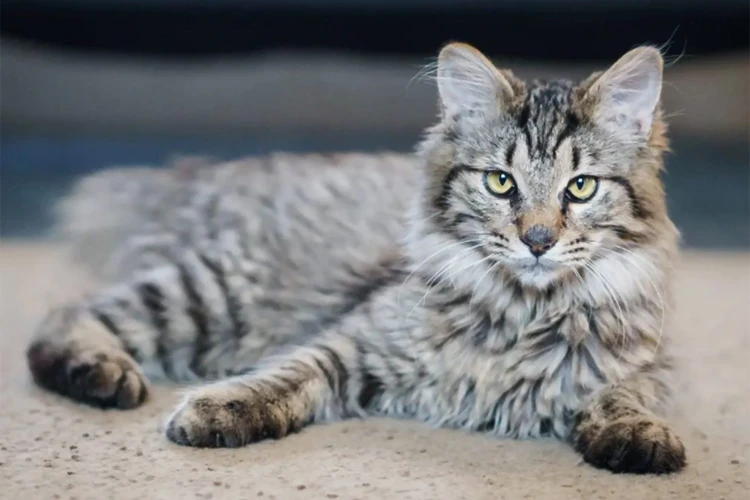
As a cat parent, it’s important to understand that every feline has unique dietary needs. American Bobtail cats are no exception to this rule. While some cats may thrive on one type of food, others may require a specialized diet to maintain optimal health. Here, we will take a closer look at some special dietary considerations you should keep in mind when feeding your American Bobtail cat. With a better understanding of these needs, you can ensure your furry friend is receiving the nutrition they need to live a long and healthy life.
Weight Management
Maintaining a healthy weight is crucial for the well-being of American Bobtail cats. Being overweight can result in multiple health concerns such as diabetes, cardiovascular disease, and joint problems. It is important to monitor your cat’s weight by weighing them regularly and consulting with a veterinarian. Here are some tips for managing your American Bobtail cat’s weight:
- Control portions: Overfeeding your cat can lead to weight gain. Measure the food accurately, and avoid leaving food out all day. Instead, establish a feeding schedule and stick to it.
- Choose a high-protein, low-carbohydrate diet: A diet rich in protein can help your cat feel full for longer, which can prevent overeating. Low-carbohydrate diets can also be beneficial for weight management, as extra carbohydrates can be stored as fat in the body.
- Incorporate exercise: Encourage your cat to be active by providing toys or playing with them. Even a few minutes of playtime can help your cat burn calories and shed excess weight.
- Monitor treats: Treats should only be given in moderation and should not make up a significant portion of your cat’s diet. Consider using low-calorie treats or incorporating treats into your cat’s daily food intake.
By following these weight management tips, you can help your American Bobtail cat maintain a healthy weight and reduce the risk of weight-related health complications.
Food Allergies and Intolerances
Food allergies and intolerances are not uncommon in American Bobtail cats. As a responsible pet parent, it is important to keep an eye out for any sign of allergic reactions or intolerance to specific foods. Some common signs of food allergies or intolerance include vomiting, diarrhea, itchy skin, and respiratory issues.
If your American Bobtail cat shows any of these symptoms, it’s important to take them to the vet to determine the underlying cause. After ruling out any serious health concerns, your vet may recommend a diet change.
Here are some common ingredients that may cause allergic reactions or intolerance in American Bobtail cats:
- Corn
- Wheat
- Soy
- Dairy products
- Artificial preservatives
- Artificial colors and flavoring
If your American Bobtail cat is diagnosed with a food allergy or intolerance, your vet may recommend a specially-formulated hypoallergenic food that is free from the offending ingredient(s). It’s important to commit to feeding your cat only the recommended food and avoiding any treats or table scraps that may contain the allergen.
Switching to a new diet may take some time for your cat to adjust to. Be patient and follow your vet’s instructions closely to help your furry friend get the nutrition they need without any adverse reactions.
In the case of severe or life-threatening allergic reactions, your vet may prescribe medication or recommend an emergency plan to manage potential future reactions.
Remember, being aware of your American Bobtail cat’s dietary needs and potential allergies or intolerances is an important part of keeping them healthy and happy.
Health Conditions
It is important to take into account any preexisting health conditions that your American Bobtail cat may have when planning their diet. Some health conditions may require strict dietary restrictions or changes in nutrient intake. Here are some common health conditions and dietary considerations for American Bobtail cats:
- Diabetes: Cats with diabetes require a diet that is low in carbohydrates and high in protein to help maintain their blood sugar levels. It is best to consult with a veterinarian to determine the appropriate diet for a diabetic cat.
- Renal Disease: Cats with renal disease will require diets that are low in protein, phosphorus, and sodium. Specialized renal diets are available commercially or can be prepared at home with the help of a veterinarian.
- Bladder Stones: Cats with bladder stones require a diet that is low in magnesium, phosphorus, and calcium. It is important to consult with a veterinarian to determine the appropriate diet for a cat with bladder stones.
- Food Allergies: American Bobtail cats that have food allergies or intolerances may require diets that are free from certain ingredients such as grains, dairy, or certain proteins. It is important to identify the source of the allergy or intolerance and work with a veterinarian to develop an appropriate diet.
- Inflammatory Bowel Disease (IBD): Cats with IBD may benefit from diets that are easily digestible and low in fat. In some cases, a hypoallergenic diet may be needed. It is important to work with a veterinarian to develop a diet that meets the necessary nutritional requirements while also managing IBD symptoms.
By taking into account any health conditions that your American Bobtail cat may have, you can help manage their symptoms and improve their overall health and well-being. Consult with a veterinarian to determine the best dietary approach for your cat’s specific needs.
Feeding Your American Bobtail Cat
As a cat owner, ensuring that your American Bobtail cat gets the proper nutrition is crucial to their overall wellbeing. With the vast array of options available, it can be perplexing to determine what to feed your feline friend. From commercial cat food to home-cooked meals, and even raw food diets, there are numerous options to consider. In this section, we will explore different feeding options for your American Bobtail cat and provide guidelines for making the best dietary choices.
Commercial Cat Food
When it comes to feeding your American Bobtail cat, commercial cat food can be a convenient and practical choice. There are several types of commercial cat food on the market, including dry kibble, wet or canned food, and semi-moist food. It’s important to choose a high-quality food that meets the nutritional needs of your cat.
One key aspect to consider when choosing a commercial cat food is the protein content. American Bobtail cats are carnivorous and require a diet that is high in protein. Look for cat food that has a high percentage of animal-based protein sources, such as chicken, beef, turkey, or fish. Check the label for the percentage of crude protein, and make sure it is at least 30%.
Another important factor to consider is the carbohydrate content. While carbohydrates are not essential for cats, they can provide a source of energy. However, too many carbohydrates can contribute to obesity and other health problems. Look for cat food that has a low percentage of carbohydrates, typically less than 10%.
It’s also important to choose cat food that contains the right amount of essential fatty acids. Omega-3 and omega-6 fatty acids are necessary for maintaining healthy skin and coat, as well as contributing to overall health. Look for cat food that contains these fatty acids, as well as other essential vitamins and minerals.
When shopping for commercial cat food, be wary of brands that use fillers such as corn, wheat, or soy. These ingredients can be difficult for cats to digest and may contribute to allergies or intolerances. Instead, look for cat food that uses high-quality ingredients and does not contain artificial preservatives, colors or flavors.
Pros of Commercial Cat Food:
- Convenient and readily available
- Easy to store and use
- Can meet your cat’s nutritional needs when choosing the right brand
Cons of Commercial Cat Food:
- May contain excessive preservatives, colors, or flavors
- May not be ideal for cats with certain health conditions or sensitivities
- May be more expensive in the long run compared to homemade diets
Commercial cat food can be a suitable choice for feeding your American Bobtail cat. However, it’s important to choose a high-quality brand that meets your cat’s nutritional needs and does not contain any harmful fillers or preservatives. As always, consult with your veterinarian before making any changes to your cat’s diet.
Raw Food Diets
If you’re considering feeding your American Bobtail cat a raw food diet, it’s important to understand the potential benefits and risks. A raw food diet typically consists of uncooked meat, bones, and organs, mimicking the diet of a wild cat. This type of diet can provide increased nutrition and promote dental health, but it can also be tricky to get the balance of nutrients just right.
Benefits of a Raw Food Diet
Proponents of raw food diets for cats claim several benefits, including:
| Benefit: | Description: |
|---|---|
| Increased Nutrition: | Raw meat and organs can provide higher levels of protein, vitamins, and minerals than processed commercial cat food. |
| Promotes Dental Health: | Chewing on bones can help clean teeth and promotes healthy gums. |
| Lower Carbohydrate: | Raw food diets typically have lower levels of carbohydrates compared to commercial cat food, which can be beneficial for some cats. |
Risks of a Raw Food Diet
However, a raw food diet also carries some risks that owners should be aware of:
| Risk: | Description: |
|---|---|
| Bacterial Contamination: | Raw meat can contain harmful bacteria like salmonella or E. coli, which can make cats or humans sick. Owners must take careful precautions when handling and preparing raw food. |
| Nutritional imbalances: | Getting the right balance of nutrients in a raw food diet can be difficult. Cats may not get enough essential vitamins and minerals, or they may consume too much of certain nutrients that can be harmful in excess. |
| Bone Obstruction: | If cats consume bones that are too large or sharp, it can lead to gastrointestinal blockages or even perforations. |
If you are interested in feeding your American Bobtail a raw food diet, it’s important to speak with your veterinarian to ensure that it is a good fit for your cat’s individual needs. Your vet can also help you come up with a plan for sourcing high-quality, safe raw food and determining the appropriate balance of nutrients for your cat’s diet.
Home-Cooked Meals
One alternative to commercial cat food is to provide your American Bobtail with homemade meals. This can give you more control over the quality of ingredients and allows you to tailor your cat’s diet to their specific needs. However, it’s important to note that creating a nutritionally balanced diet for your cat can be challenging, and it’s essential to consult with a veterinarian or feline nutrition specialist before making any significant changes to their diet.
Benefits of Home-Cooked Meals:
- Control over ingredients: When you prepare your cat’s food at home, you can select the quality of ingredients that go into it, such as using hormone-free meats or organic vegetables.
- Customizable: You can tailor your cat’s diet to their specific needs, whether they require more protein or fat, or if they have food sensitivities or allergies.
- Freshness: When you prepare meals at home, you can ensure the food is fresh and free from preservatives.
Creating a Balanced Home-Cooked Diet:
Creating a balanced diet for your cat requires careful planning and preparation. A well-rounded diet should include:
- Protein: American Bobtails need a diet high in animal-based protein, usually from meat or fish sources.
- Fat: Your cat’s diet should contain essential fatty acids, such as omega-3 and omega-6, which are necessary for several bodily functions, including coat health and brain function.
- Carbohydrates: While cats don’t require carbohydrates, small amounts of grains or vegetables can provide essential fiber and nutrients in their diet, as long as they’re cooked.
- Vitamins and minerals: Your cat’s diet should contain a variety of essential vitamins and minerals, including taurine, which is necessary for heart and eye health.
Preparing Homemade Cat Food:
When preparing homemade meals, it’s essential to follow recipes designed for cat nutrition to ensure balanced meals. Some recipes may include cooked meats, vegetables, and grains, while others may include raw meat. Raw food diets can pose health risks from bacterial contamination, so it’s essential to handle and prepare raw ingredients carefully.
Supplements:
Even with careful planning, homemade diets may still lack specific nutrients. Your veterinarian may recommend supplements based on your cat’s individual needs.
While home-cooked meals may offer several benefits, supplementing or replacing with commercial cat food may provide a more consistent and nutritionally balanced diet. Consult with your veterinarian or a feline nutrition specialist to determine the best diet for your American Bobtail.
Feeding Schedule
Creating a feeding schedule for your American Bobtail cat is crucial to maintaining their health and well-being. This involves considering their age, weight, activity level, and any underlying health conditions. When creating a feeding schedule, it is important to measure out the appropriate portion sizes and stick to a consistent feeding routine.
Table 1: Example of Feeding Schedule for Adult American Bobtail Cat
| Meal Time | Portion Size | Feeding Method |
|---|---|---|
| 6:00 AM | 1/4 cup | Dry kibble |
| 12:00 PM | 1/4 cup | Dry kibble |
| 6:00 PM | 1/4 cup | Wet food |
| 9:00 PM | 1/4 cup | Dry kibble |
When creating a feeding schedule, it is important to consult with your veterinarian to ensure that you are providing your American Bobtail cat with the appropriate amount of nutrients. For kittens, they will require more frequent and smaller meals throughout the day. As they reach adulthood, their feeding schedule can be adjusted to fewer and larger portions.
It is also important to note that free-feeding, or leaving food out all day for your cat to graze on, is not recommended. This can lead to overeating and obesity, as well as attracting other pests and animals to your home. Instead, sticking to a consistent feeding schedule can help regulate their appetite and ensure they are receiving the appropriate amount of nutrients.
In addition to meal times, always make sure to have fresh water available to your American Bobtail cat. Water is crucial to their overall health and can help prevent urinary tract infections and kidney issues. Consider investing in a water fountain or providing multiple water dishes around your home to encourage your cat to stay hydrated.
Creating a feeding schedule for your American Bobtail cat is an important aspect of their overall health and well-being. By considering their age, weight, activity level, and any underlying health conditions, you can provide them with the appropriate amount of nutrients and ensure they maintain a healthy appetite. Always consult with your veterinarian and use their guidance to create a personalized feeding schedule for your furry companion.
Water Needs
Proper hydration is crucial for the overall health and well-being of your American Bobtail cat. Cats are notorious for being poor drinkers, which means they rely heavily on getting enough water from their food. As a responsible cat owner, it’s your job to make sure your furry friend is well-hydrated.
Why Do Cats Need Water?
Water is essential for a healthy cat for several reasons. It helps to transport important nutrients throughout the body, aids in digestion and helps regulate body temperature. Without enough water, cats are at risk of becoming dehydrated, which can lead to serious health issues such as urinary tract infections, kidney disease, and even death.
How Much Water Do American Bobtail Cats Need?
The amount of water your American Bobtail cat needs can vary depending on factors such as their age, weight, activity level, and diet. However, a general rule of thumb is that cats should consume approximately 3.5-4.5 ounces of water per 5 pounds of body weight each day.
Signs of Dehydration in Cats
It’s important to be aware of the signs of dehydration in cats. Some of the most common symptoms include lethargy, dry or sticky gums, sunken eyes, and loss of skin elasticity. If you notice any of these signs in your American Bobtail, it’s important to take action immediately.
How to Ensure Your Cat is Well-Hydrated
There are several ways you can encourage your American Bobtail to drink more water. One simple solution is to provide fresh, clean water at all times. Make sure you clean your cat’s water bowl regularly to avoid any bacteria growth or contaminants. Adding a water fountain to your cat’s feeding area is also a great way to encourage them to drink more water.
Another option is to incorporate wet food into your cat’s diet. Wet food is higher in moisture content than dry kibble, providing your furry friend with an additional source of water. If you’re looking to add more water to your cat’s meals, you can also mix a small amount of water into their food.
Making sure your American Bobtail cat is well-hydrated is a crucial part of their overall health and well-being. Keep an eye out for signs of dehydration and take action to encourage your furry friend to drink more water. By providing fresh, clean water, incorporating wet food, and monitoring your cat’s water intake, you can help ensure they lead a happy and healthy life.
- Water is essential for nutrient transportation, digestion, and regulating temperature
- Cats should consume 3.5-4.5 ounces of water per 5 pounds of body weight daily
- Signs of dehydration include lethargy, dry/sticky gums, sunken eyes, and loss of skin elasticity
- Ways to encourage water consumption include providing fresh water, adding a water fountain, incorporating wet food, and mixing a small amount of water into meals
Conclusion
After learning about the nutritional requirements and special considerations for American Bobtail cats, it’s clear that a balanced and appropriate diet is essential for their overall health and vitality. Providing adequate amounts of protein, carbohydrates, fats, vitamins, and minerals through a variety of high-quality commercial foods, raw diets, or home-cooked meals can ensure that your cat receives all the necessary nutrients.
However, it’s not only about the type of food but also about the portion sizes and feeding schedule. Overfeeding can lead to obesity, which can put your cat at risk for various health conditions. Regular check-ups with a veterinarian can help you determine the best feeding plan for your cat’s specific needs.
Furthermore, it’s important to be aware of any food allergies or intolerances that your cat may have and adjust their diet accordingly. In addition, if your cat has a health condition, such as kidney disease or diabetes, their dietary requirements may differ from other cats.
Overall, feeding your American Bobtail cat a balanced and appropriate diet, while taking into consideration their individual needs, is crucial for their overall wellbeing. By doing so, you can ensure a long and healthy life for your beloved feline companion.
Frequently Asked Questions
What is the ideal protein content for American Bobtail cat food?
The ideal protein content for American Bobtail cat food should be around 25-30% of their daily diet.
What are the best sources of protein for American Bobtail cats?
The best sources of protein for American Bobtail cats are chicken, turkey, beef, and fish.
Can American Bobtail cats have grains in their diet?
American Bobtail cats are obligate carnivores and do not require grains in their diet. However, small amounts of whole grains such as quinoa, oats, and brown rice can be added for fiber and nutrients.
What are the essential vitamins and minerals that American Bobtail cats need?
American Bobtail cats need essential vitamins and minerals such as vitamin A, vitamin D, vitamin E, vitamin K, vitamin B12, calcium, phosphorus, and magnesium.
How can I help my American Bobtail cat maintain a healthy weight?
You can help your American Bobtail cat maintain a healthy weight by feeding them a balanced diet, providing plenty of exercise and playtime, and avoiding overfeeding or giving too many treats.
What should I do if my American Bobtail cat has a food allergy or intolerance?
If your American Bobtail cat has a food allergy or intolerance, you should switch them to a hypoallergenic or limited ingredient cat food that does not contain the allergen.
Can American Bobtail cats eat raw food diets?
Yes, American Bobtail cats can eat raw food diets, but it is important to properly balance the diet and consult with a veterinarian before making any dietary changes.
Is it safe to give my American Bobtail cat home-cooked meals?
Yes, it is safe to give your American Bobtail cat home-cooked meals as long as they are nutritionally balanced and meet their dietary needs.
How often should I feed my American Bobtail cat?
You should feed your American Bobtail cat 2-3 small meals per day, or leave dry food out for them to graze on throughout the day.
Why is it important for American Bobtail cats to have access to fresh water?
It is important for American Bobtail cats to have access to fresh water to prevent dehydration, encourage proper digestion, and maintain overall health.

